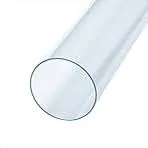okt . 10, 2024 02:04 Back to list
HDPE Sewer Pipe Advantages and Applications in Modern Infrastructure Solutions
Understanding HDPE Sewer Pipes Benefits and Applications
High-Density Polyethylene (HDPE) sewer pipes have gained significant popularity in construction and infrastructure projects due to their durability, flexibility, and cost-effectiveness. These pipes are engineered from high-quality polyethylene resin, making them a preferred choice for underground sewage systems. This article delves into the characteristics, advantages, and applications of HDPE sewer pipes.
One of the foremost benefits of HDPE sewer pipes is their superior resistance to corrosion and chemical reactions. Unlike traditional materials like metal or concrete, HDPE pipes do not rust or corrode, ensuring a longer lifespan and reduced maintenance costs. They can withstand harsh environmental conditions and are resistant to a wide range of chemicals, making them ideal for sewage and wastewater applications.
Understanding HDPE Sewer Pipes Benefits and Applications
Moreover, HDPE sewer pipes are joined using a variety of methods, including butt fusion, electrofusion, and socket fusion. These methods create strong, leak-proof joints that further contribute to the integrity of the sewage system. The seamless construction of HDPE pipes minimizes the risk of leaks, which is crucial for preventing contamination of surrounding soil and groundwater.
hdpe sewer pipe

In terms of environmental impact, HDPE pipes are also a favorable option. They are fully recyclable, reducing waste in landfills and contributing to sustainability efforts. The production of HDPE involves less energy compared to traditional pipe materials, further lowering their carbon footprint. Additionally, the reduced need for maintenance and replacement translates to lower resource consumption over the pipes' lifespan.
In urban development and infrastructure projects, HDPE sewer pipes are particularly advantageous. Their resistance to upheaval and high-flow capacity make them suitable for use in areas with fluctuating water tables and increased urban runoff. As cities continue to grow, the demand for effective wastewater management systems rises, making HDPE an ideal solution.
HDPE sewer pipes come in various sizes and thicknesses, allowing for customization based on specific project requirements. This versatility means they can be utilized in various applications, from residential sewer systems to large-scale municipal wastewater projects. Engineers and contractors increasingly opt for HDPE due to its reliability and performance under various conditions.
In conclusion, HDPE sewer pipes represent a modern, efficient, and sustainable solution for waste management. Their durability, flexibility, and environmental benefits make them a superior choice in the construction industry. As infrastructure needs continue to evolve, HDPE pipes will likely play an essential role in future developments, ensuring reliable and effective sewage systems for communities worldwide.
-
Premium PVC-M Water Supply Pipe - Durable & Efficient
NewsAug.02,2025
-
Premium PP Welding Rod: GPT-4 Turbo Enhanced
NewsAug.01,2025
-
HDPE Drainage & Irrigation Pipe - Durable, Efficient Solutions
NewsAug.01,2025
-
Premium PVC Transparent Pipe: Durable & Clear Solutions
NewsJul.31,2025
-
High-Quality UPVC Electrical Pipe for Safe Wiring Solutions
NewsJul.30,2025
-
Premium PVC Pipe Fitting Supplier – Durable & Leak-Proof Solutions
NewsJul.30,2025

